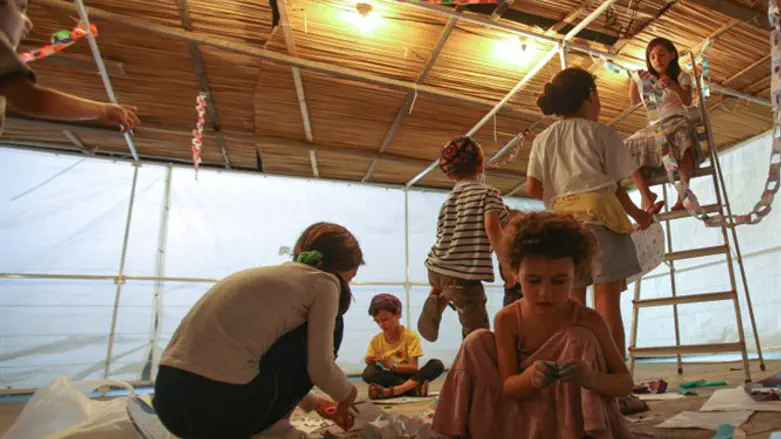
For the Lord your God will bless all your crops and all your undertakings, and you shall have nothing but joy
God promises us immense blessings for observing the holiday of Sukkot---God will bless all our crops and all our undertakings. Yes, this will give us nothing but joy.
“After the ingathering from your threshing floor and your vat, you shall hold the Feast of Booths for seven days. You shall rejoice in your festival, with your son and daughter, your male and female slave, the Levite, the stranger, the fatherless, and the widow in your communities. You shall hold a festival for the Lord your God seven days, in the place that the Lord will choose; for the Lord your God will bless all your crops and all your undertakings, and you shall have nothing but joy.” (Deuteronomy 16:13-16).
We read in parshot Nitzavim that God promises us that in future times He will bring us to the Land our forefathers (Abraham, Isaac, and Jacob) possessed and will make us more prosperous and more numerous than our fathers.
“When all these things befall you—the blessing and the curse that I have set before you—and you take them to heart amidst the various nations to which the Lord your God has banished you, and you return to the Lord your God, and you and your children heed His command with all your heart and soul, just as I enjoin upon you this day, then the Lord your God will restore your fortunes and take you back in love. He will bring you together again from all the peoples where the Lord your God has scattered you. Even if your outcasts are at the ends of the world, from there the Lord your God will gather you, from there He will fetch you. And the Lord your God will bring you to the land that your fathers possessed, and you shall possess it; and He will make you more prosperous and more numerous than your fathers.” (Deuteronomy 30:1-5)
The Bible records the people of Israel celebrating the holiday of Sukkot in the time of Ezra and Nehemiah after the Babylonian Exile:
“...and that they must announce and proclaim throughout all their towns and Jerusalem as follows, 'Go out to the mountains and bring leafy branches of olive trees, pine trees, myrtles, palms and [other] leafy trees to make booths, as it is written.' So the people went out and brought them, and made themselves booths on their roofs, in their courtyards, in the courtyards of the House of God, in the square of the Water Gate and in the square of the Ephraim Gate. The whole community that returned from the captivity made booths and dwelt in the booths—the Israelites had not done so from the days of Joshua son of Nun to that day—and there was very great rejoicing. He read from the scroll of the Teaching of God each day, from the first to the last day. They celebrated the festival seven days, and there was a solemn gathering on the eighth, as prescribed.” (Nehemiah 8:15-18).
The Talmud in Tractate Arachin 32b, cites a controversy whether Joshua’s consecration of the Land of Israel was for all times or only until an exile after which returnees would need to consecrate the Land again.
God redeemed us from the slavery of Egypt. Moses, Aaron, and Miriam led us through the desert for 40 years. Joshua led us to Israel and consecrated the Land, the land of Abraham, Isaac and Jacob.
For our sins, God exiled us to Babylonia. Ezra and Nehemiah were leaders of the returnees from Babylonia.
This is my interpretation of “The whole community that returned from the captivity made booths and dwelt in the booths—the Israelites had not done so from the days of Joshua son of Nun to that day…”
It is not that there were actually no Sukkot holiday celebrations between Joshua's time to the days of Ezra and Nehemiah. King David, King Solomon, everyone made Sukkot. What was not done from the days of Joshua to that day was the consecration: “The whole community that returned from the captivity” making Sukkot. This was the cause of the words “and there was very great rejoicing.”
I made Aliya from America. All those who make Aliya are returnees from exile. We rejoice greatly in our Sukkot. We’re living in a favorable moment: “As for me, may my prayer come to You, O Lord, at a favorable moment; O God, in Your abundant faithfulness, answer me with Your sure deliverance.” (Psalms 69:14).
God is answering all our prayers as we fight our wicked enemies, much as God answered King David’s prayers “For in the day of trouble
He will keep me safe in His sukkah...Do not subject me to the will of my foes, for false witnesses and unjust accusers have appeared against me. Had I not the assurance that I would enjoy the goodness of the Lord in the land of the living…” (Psalms 27:12-13). And this, not coincidentally, is the psalm we recite every day from the start of the month of Elul to Hoshana Rabba, at the end of the Sukkot holiday.